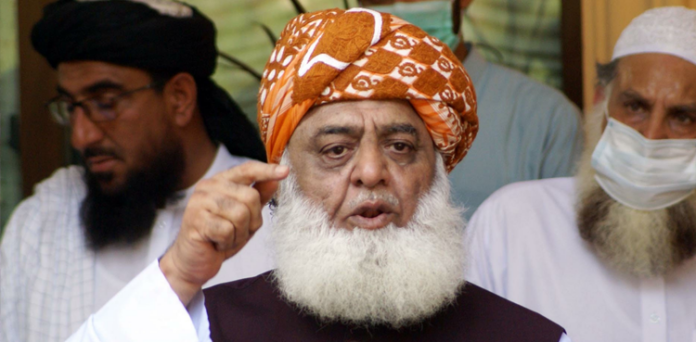Government’s Draft Bill
Jamiat Ulema-e-Islam-Fazl (JUI-F) leader Maulana Fazlur Rehman has firmly rejected the government’s draft bill concerning religious schools, commonly known as madressahs.
He emphasized that the purpose of rejecting the draft was not to confront the government but rather to ensure the proper registration of seminaries. Fazl expressed concerns that attempts to impose reforms were creating divisions among religious scholars.
Speaking to reporters in Charsadda, Khyber Pakhtunkhwa, on Monday, Fazl criticized the ongoing situation, stating that “scholars are being pitted against each other.” He alleged that the government’s recent meeting on madressah registration and reforms in Islamabad was part of a broader “conspiracy to divide scholars.”
The meeting brought together prominent religious scholars from across Pakistan, with the aim of gathering their opinions on the matter. However, Fazl views the initiative as an attempt to politicize religious education and sow divisions.
The JUI-F leader emphasized that his party and its supporters remain committed to protecting religious schools, supporting their rights, and advocating for their causes. He expressed respect for the efforts of scholars in Islamabad but cautioned the government against politicizing religious institutions and their reforms.
Fazl had previously promised to make a “definitive announcement” regarding the madressah bill on Sunday, but this did not occur. Additionally, he raised concerns about the government’s inconsistency, questioning why the president could sign other legislative acts but not the madressah bill.
Fazl further alleged that the government has refused to incorporate any of their proposals and expressed skepticism about the success of potential new political measures such as governor’s rule.
Amid these political tensions, Fazl postponed his party’s march to Islamabad, which was intended to pressure the government into passing reforms. Instead, he proposed holding a meeting with all allied madressahs to build consensus and adopt a unified stance. The meeting is expected to take place on December 16 or 17 in order to ensure all parties are on the same page moving forward.
Meanwhile, Federal Interior Minister Mohsin Naqvi met with Maulana Fazl Rahim Ashrafi, the patron-in-chief of Wafaq ul Madaris, at Jamia Ashrafia. During this meeting, they discussed the ongoing seminaries’ bill and agreed that political interference in the reform process should be avoided.
Rahim suggested that seminaries in Punjab should fall under the Education Department, mirroring the federal government’s approach. The interior minister appreciated the Wafaqul Madaris’ assurances to maintain a positive role in the reforms.
The draft bill in question, the Societies Registration (Amendment) Bill, 2024, has roots in the agreement between JUI-F and the government supporting the 26th Constitutional Amendment.
This bill extends the provisions of the Societies Registration Act of 1860 and introduces specific regulations for the registration of Deeni Madaris through the deputy commissioner’s office.
Under the proposed legislation, seminaries with multiple campuses would require only a single registration rather than individual ones for each campus. Additionally, madressahs would be mandated to submit an annual report of their educational activities to the registrar and have their financial accounts audited, with the audit report also submitted for review.
The bill explicitly prohibits seminaries from promoting militancy, sectarianism, or religious hatred, emphasizing transparency and accountability within religious educational institutions.
These developments highlight the complexity of political, social, and religious dynamics at play as efforts to reform madressah registration continue to unfold.


